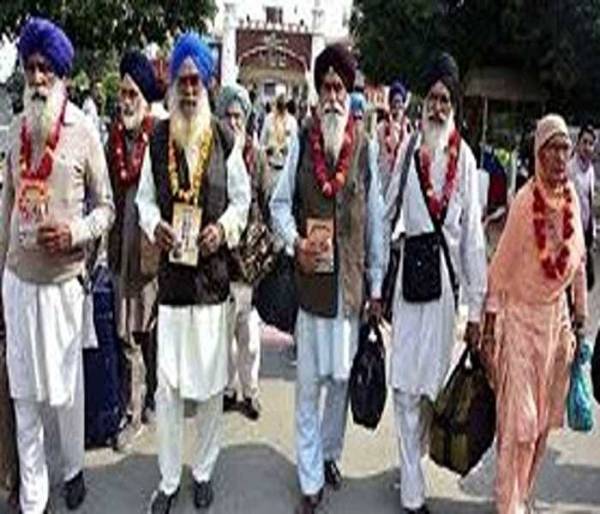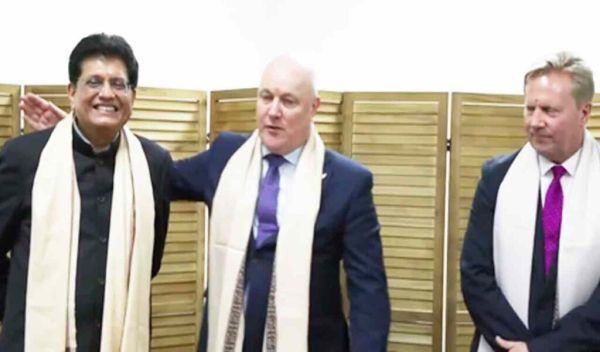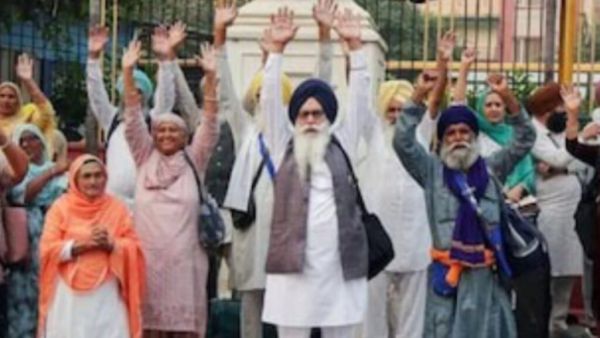
Guru Nanak Jayanti: In a recent development that stirred emotions across borders, several Indian Hindu devotees were reportedly denied entry into Pakistan during the celebrations of Guru Nanak Dev’s 556th birth anniversary. While over 2,100 Indian Sikh pilgrims successfully crossed the Wagah border on Tuesday to take part in the religious events, at least 14 Hindu devotees were allegedly stopped by Pakistani authorities with the remark, “You are Hindu… you can’t go with Sikh devotees.” The incident not only highlights a sensitive religious issue but also underscores the strained relations between India and Pakistan, especially concerning cross-border pilgrimages and people-to-people connections.
Pilgrimage and the Significance of Guru Nanak Jayanti
Every year, thousands of Sikh devotees from India make their way to Pakistan to celebrate the birth anniversary of Guru Nanak Dev Ji, the founder of Sikhism. The pilgrimage is a deeply spiritual journey, symbolizing peace, faith, and devotion. Pakistan’s Evacuee Trust Property Board (ETPB) and Pakistan Sikh Gurdwara Parbandhak Committee (PSGPC) usually facilitate these visits, ensuring that Sikh pilgrims can visit sacred sites such as Gurdwara Janamasthan Nankana Sahib, Gurdwara Panja Sahib Hasan Abdal, Gurdwara Sacha Sauda Farooqabad, and Gurdwara Darbar Sahib Kartarpur.
This year, the Pakistan government issued 2,150 visas to Indian Sikh pilgrims, allowing them to enter the country for the special occasion. The event is not only religiously significant but also serves as one of the few remaining bridges of cultural exchange between the two nations.
Controversy at the Border: Hindus Denied Entry
Despite the positive gesture of opening the borders for Sikh pilgrims, reports of discrimination at the immigration counter surfaced when around 14 Indian Hindus were denied entry. According to media reports, the officials allegedly told them that they could not accompany the Sikh devotees due to their religious identity. This incident raises concerns about religious freedom and inclusivity, especially since many Hindus often participate in Sikh religious events in India without any restrictions.
Officials from Pakistan, including ETPB spokesperson Ghulam Mohyuddin, confirmed the arrival of over 2,100 Sikh pilgrims but made no mention of any Hindus being barred. Sources further revealed that more than 300 non-Sikhs had applied for Pakistani visas to join the pilgrimage, but they were reportedly stopped as they lacked formal approval from India’s Ministry of Home Affairs (MHA). The issue seems to lie within both bureaucratic and political frameworks, complicating what should have been a purely spiritual journey.
Warm Welcome for Sikh Pilgrims
Once the Sikh pilgrims arrived in Lahore, they were warmly received by Sardar Ramesh Singh Arora, President of PSGPC and Punjab’s Minister for Minorities, along with ETPB Chief Sajid Mahmood Chauhan and Additional Secretary Shrines Nasir Mushtaq. Special buses were arranged to transport the devotees to Gurdwara Janamasthan in Nankana Sahib, about 80 km from Lahore.
The Pakistani authorities reportedly made extensive security arrangements, including the deployment of Rangers, police, and special forces to ensure the safety of the pilgrims. Medical teams from Rescue 1122 and the ETPB medical unit were also assigned to provide on-ground support. All gurdwaras, including Kartarpur Sahib, were beautifully decorated, reflecting the festive spirit and reverence surrounding Guru Nanak Jayanti.
The Broader India-Pakistan Context
The denial of entry to Hindu pilgrims has once again brought attention to the fragile relationship between India and Pakistan. Tensions between the two countries escalated after the Pahalgam terror attack earlier this year, leading to a four-day conflict in May. Since then, diplomatic engagement has been minimal, and both countries have imposed airspace restrictions against each other.
Despite these tensions, religious pilgrimages—especially under the Kartarpur Corridor Agreement—have remained a rare avenue of contact between the two sides. However, incidents like this risk undermining that goodwill and could potentially discourage interfaith participation in future pilgrimages.
Religious Freedom and Interfaith Harmony
The essence of Guru Nanak’s teachings lies in equality, compassion, and unity among all human beings, regardless of religion or nationality. Denying access to devotees on the basis of religion goes against these very principles. The Sikh and Hindu communities in India share deep cultural and historical ties, often participating in each other’s festivals and religious gatherings.
Restricting Hindu devotees from joining the celebrations contradicts the message of universal brotherhood that Guru Nanak propagated. Religious diplomacy, if handled sensitively, can serve as a vital tool in rebuilding trust between India and Pakistan. Instead, this incident reflects the continued mistrust and politicization of religious events.
Conclusion
The Guru Nanak Jayanti pilgrimage could have been an opportunity for goodwill and peace-building between India and Pakistan. While the participation of over 2,100 Sikh pilgrims marks a positive step toward maintaining cultural and religious links, the exclusion of Hindu devotees adds an unfortunate chapter to the story. Both nations must prioritize religious tolerance, mutual respect, and people-to-people diplomacy over political divides.
Peaceful pilgrimages should never be overshadowed by religious bias or bureaucratic hurdles. True homage to Guru Nanak lies in embracing unity and humanity—values that transcend all borders and beliefs.
-
India, New Zealand move closer with landmark bilateral trade agreement

-
Left leaders congratulate Mamdani on NY mayoral poll victory

-
Pakistan’s dangerous conspiracy on Guru Parv, 148 Indian pilgrims denied entry into Pakistan

-
Vicky Kaushal shared a special photo and wished mother Veena Kaushal a happy birthday, younger brother Sunny Kaushal sang a song…

-
TVK declares independent contest, Vijay named Chief Ministerial candidate
